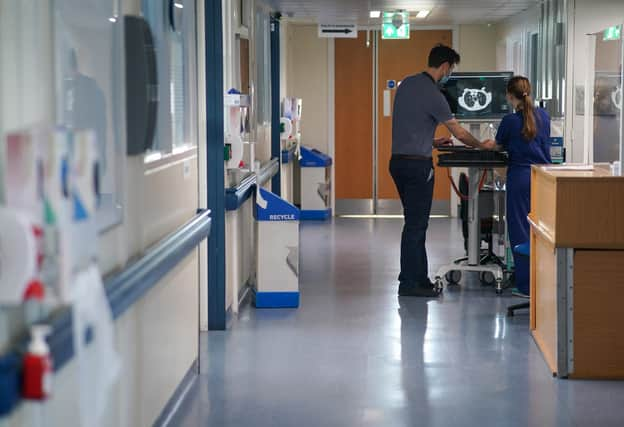NHS: Spike in non-UK nationals working for health service - but experts say it's "not a long-term solution"


Roughly one in five NHS workers are now non-UK nationals, according to new statistics.
The proportion of NHS roles in England filled by non-UK nationals has jumped sharply, with three in 10 nurses and more than a third of doctors are now non-UK nationals, driven by steep increases in recent years. Health chiefs said the figures reflected how the NHS depends on its "talented international workforce" to contend with rising demand and strike action, but warned overseas recruitment could not fill vacancies forever.
Advertisement
Hide AdAdvertisement
Hide AdIt is thought to be the highest proportion since current data began in 2009.
Indian was again the most common non-UK nationality among this group, accounting for 8.0 per cent of all doctors, followed by Pakistani (3.7 per cent), Egyptian (2.9 per cent) and Nigerian (2.0 per cent). Of the total 1,282,623 FTE hospital and community health service staff in England in September 2023 whose nationality was known, 20.4 per cent - around one in five - were non-UK nationals, PA analysis found.
Danny Mortimer, chief executive of the NHS Employers organisation, "Teams across the NHS are hugely appreciative to their overseas colleagues for their support and contribution. But there is no room for complacency, as we will not be able to continue to draw on international recruitment to fill NHS vacancies forever.
"If anything, retention is just as important as attracting new staff into the NHS and will be key in the short term to preventing pressures from worsening and ensuring the recruitment base we are looking to build from has solid foundations.Expanding the number of staff we train here is also important, so it is vital the continued expansion of training and education, set out in the NHS England long-term workforce plan, is maintained."
Advertisement
Hide AdAdvertisement
Hide AdNot all NHS staff groups have seen a rise in the percentage of the workforce who are non-UK nationals. The figure for consultants has remained broadly unchanged and there has only been a small increase in midwives. All figures are based on the latest available data from NHS Digital.
Lucina Rolewicz, researcher at the independent think tank The Nuffield Trust, said: "This is far from a sustainable, long-term solution. The NHS is still competing with other health systems for overseas staff and in some cases our working conditions, pay and career prospects may look less favourable compared to other countries.
"Not only this, but of those overseas workers that do join the UK’s nursing and midwifery workforce, nearly two in five (38 per cent) left within five years of joining the professional register in the latest year of data.
"The long-term workforce plan proposes focusing more on expanding domestic training and increasing the number of home-trained graduates working in the NHS – but these plans will only come to fruition if we reduce the number of people quitting training and attract more graduates to choose NHS jobs and then to stay longer."
Advertisement
Hide AdAdvertisement
Hide AdA Department of Health and Social Care spokesperson said: "International recruitment has a valuable role in helping the NHS deliver its world-class care, but it is important we boost the domestic workforce and decrease our reliance on agency staff and overseas workers. The first ever NHS long-term workforce plan was commissioned by the government to train, retain and reform the workforce, and put the NHS on a sustainable footing into the future.
"Backed by £2.4bn, the plan will double the number of medical school places, almost double the number of adult nurse training places, and increase the number of GP training places by 50 per cent by 2031. Through these domestic training expansions, we expect around 10 per cent of our workforce to be recruited internationally in 15 years’ time, compared to nearly a quarter today."
Comment Guidelines
National World encourages reader discussion on our stories. User feedback, insights and back-and-forth exchanges add a rich layer of context to reporting. Please review our Community Guidelines before commenting.
